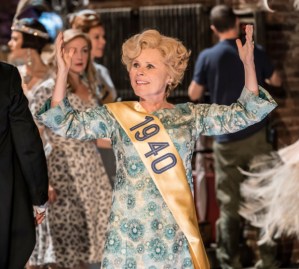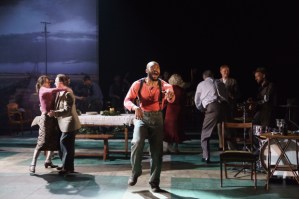Musicals must break the mould to be exciting
In the wake of ”Girl From the North Country” and ”Follies”, Matt Trueman looks at why formula musicals just don’t work
Almost every time I see a Sondheim for the first time, I end up marvelling at what musical theatre can do. You can’t line up a load of presidential assassins in a malevolent vaudeville show – can you? Are you allowed to twist fairytales out of shape, then write a second half that basically swallows the first? Sweeney Todd looks simple enough in its structure, until you clock the sheer number of moving parts at play; the dozen-plus leitmotifs, the near constant counterpointing, tunes that somehow turn themselves inside out. Sondheim’s a writer who stretches out in his art-form and, in doing so, pushes its possibilities to the very max.
Even by his standards, Follies is level-up stuff: the way it glides through ideas, thinking in themes as much as in stories; the way it gently loosens the grip of its reality, then flies off into an unexpected fantasia; the way every individual number extends the whole, so that this set of showgirl stories adds up to much more. Add to that his ability to sit concepts together – the past and performance, memory and identity – so that they entwine and enhance one another. Having not seen it before, I had no idea what was coming. Whatever I expected, it certainly wasn’t something so rich, so melancholic, so…profound.
Follies made me realise – once and for all – just how much a musical can do
Well, consider me a convert. Religion: Stephen Sondheim. Follies made me want to chase down his complete works, and repent for not doing so sooner. More than that, though, it made me realise – once and for all – just how much a musical can do.
That still comes as a surprise – probably because they’re so rarely allowed to be all they can be. There’s still – still! – a sense that musicals must follow a form; that there’s a knack to making a musical work. There are rules or, at the least, tried and tested techniques. You kick off with a kick-ass opener and end with an 11 o’clock song. Every role needs a number; every half, a good dance. Characters must have a reason to break into song, and every song must move the story along.
Hang on, though. Why? I mean, the reasons are obvious. Musicals aren’t easy, but they are expensive. That combo, inevitably, encourages conservatism. Kinks get ironed out; hits, shoehorned in. It’s a world of show doctors and out of town try-outs; a copycat culture where every hit spawns a knock-off.
Formulas allows sceptics to box musicals up, bundle them together and dismiss them as a species
These formulas give musical theatre a bad name. They allow sceptics – and I say this as a reformed sceptic – to box musicals up, bundle them together and dismiss them as a species. You’ve heard the complaint. Heck, you may even have voiced it yourself: 'Oh, I hate musicals'. It’s a sentence that lumps the lot of them together.
Follow a formula, and you let audiences get ahead. We know what’s coming next. It puts structure over story and, rather than honouring the truth of your tale, it twists the telling right out of shape. Formula musicals fill in the blanks. They engineer big first half finishes or prise space for a ballad. Frankly, it rings false.
Why? Well, think about what the word formula means. It’s something you follow (it leads, not you) in order to achieve a particular result. Mathematicians plug numbers in and arrive at an answer. Mothers feed babies formula so that they’ll grow. In both cases, the end result is known; a dead-cert. It’s the same with musicals. They aim at an effect – usually an emotional one – and they achieve it.
To be more than candyfloss and helium balloons, musicals need to find new forms
That, ultimately, is what feels so unsatisfying. Formula musicals concoct feeling artificially. They force us to feel. It’s easy to get swept along with that. You leave the theatre beaming and wake up, a week later, to find no trace remains. The flush of feeling fades, leaving nothing behind. It’s a critic’s nightmare, by the way. Your rave’s set in ink, as the show fades from view. It’s happened to me more often than I’d care to admit – Bend It Like Beckham, Made in Dagenham, maybe Groundhog Day too. They work as entertainment – a good night out. As art, not so much. They’re candyfloss and helium balloons – airy nothings that deflate.
To be more than that, I suspect, musicals need to find new forms. Art – or the best art – reinvents itself every time. It refuses old moulds in order to seek out new meaning. Look around at the last decade’s musicals and it is those that find their own form that stand out – from Fun Home to London Road. It’s one of the things that runs through the tributes to the composer Michael Friedman, who died this weekend. Bloody Bloody Andrew Jackson was a musical in a mould of its own.
London has another at the moment, on top of Follies: Girl from the North Country. It’s structure isn’t conventional – more a set of short stories than a trad linear narrative – and its score finds its own way of functioning. We get shards of songs, most of which catch a moment or a mood rather than telling a story. The result is something far more elusive and expressive than your average musical – a piece full of real feeling and something like truth. That comes, as in Follies, from finding its own form and making a musical like none that’s gone before.
















